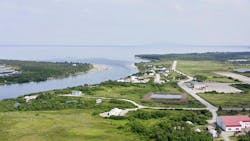NREL Will Join Effort to Bridge Gaps in Island Energy Resilience
In Alaska, flooding and erosion pose imminent threats to 31 rural villages. Of those, more than a third must relocate.
In rural Northern California, inland American Indian reservations risk being “islanded” from the larger grid should a wildfire disable the single transmission line that delivers energy to their homes, businesses and critical services providers.
In the Northeast, year-round residents of 15 island communities off the coast of Maine face electricity rates as high as four times the national average because of aging infrastructure, seasonal fluctuations in demand and lack of efficiencies of scale.
In the U.S. Virgin Islands, communities rely on imported fossil fuel to produce desalinated, drinkable water and meet more than 98% of their electricity demand. This heavy dependence on diesel and propane results in utility rates three times higher than the U.S. average and leaves the territory vulnerable to outages.
Across the country, remote rural municipalities like these are reinventing themselves as resilient communities — places where folks can live in harmony with the rugged environments that have sustained and challenged residents for generations.
Although they face different challenges and risks posed by the unique set of conditions in their particular region, nearly all remote and islanded communities in the United States today share one thing in common: They are pursuing holistic, long-term strategies to shore up their vulnerabilities.
Because of their geographic isolation, remote and islanded communities face unique energy and infrastructure challenges and are especially vulnerable to energy disruptions. Overcoming these challenges and reducing risk requires ramping up resilience — often with limited resources and capacity.
As a partner in a new U.S. Department of Energy (DOE)-sponsored initiative, the National Renewable Energy Laboratory (NREL) aims to bridge that gap by providing resources and access to on-the-ground support for remote and islanded communities seeking to transform their energy systems and lower their vulnerability.
Cross-cutting coalition to compound impact
The cross-sector initiative will build on the framework developed by the DOE Office of Energy Efficiency and Renewable Energy’s Energy Transitions Initiative (ETI), pooling the tools and technical assets of community-based organizations and DOE’s national laboratories to advance energy transitions.
Intended to compound the impact of ETI's proven resilience framework, the ETI Partnership Project (ETIPP) will leverage NREL’s 10+ years of work building resilience in remote communities worldwide, as well as the cross-cutting experience and expertise of:
- DOE Office of Strategic Programs (OOSP)
- DOE Water Power Technologies Office (WPTO)
- DOE Solar Energy Technologies Office (SETO)
- Pacific Northwest National Laboratory
- Lawrence Berkeley National Laboratory
- Sandia National Laboratories.
ETIPP will combine deep energy sector experience with specialized local expertise to address energy challenges, build capacity, and accelerate the sharing of best practices and innovations. NREL and team have selected and are finalizing contracts with the following community-based partners to work with communities on stakeholder and capacity development:
- Alaska Center for Energy and Power
- Coastal Studies Institute
- Hawaii Natural Energy Institute
- Island Institute
- Renewable Energy Alaska Project (REAP).
Resilience framework prioritizes community concerns
Together, this broad coalition will work alongside competitively selected communities to plan for, withstand and recover from disruptions. In fall 2020, communities will be able to apply to participate in this multiyear collaborative effort to achieve their resilience goals.
Drawing upon ETI's holistic, community-driven approach to building resilience, the ETIPP network will provide technology-neutral technical assistance that prioritizes local challenges, values and goals. Working collaboratively with communities, the experienced ETIPP network will identify and advance strategic, tailored technological solutions designed to bolster community resilience and reduce economic risk.
“The same technical assistance framework NREL developed and used in collaboration with ETI to advance successful energy transitions in Hawaii and the U.S. Virgin Islands can be tailored to ETIPP communities seeking to strengthen their resilience posture and mitigate their risks,” said Elizabeth Doris, Ph.D., laboratory program manager for State, Local and Tribal Governments.
"Applying this whole-systems approach will inform high-impact infrastructure investments in remote and islanded communities — from Alaska to Maine to the Caribbean — where resilient residents confront imminent threats with strategic solutions that consider their unique energy challenges."
Learn more about NREL's work with state, local, and tribal governments.
